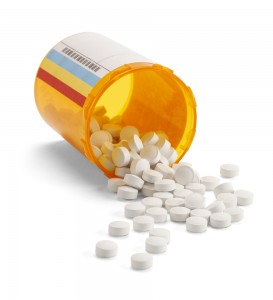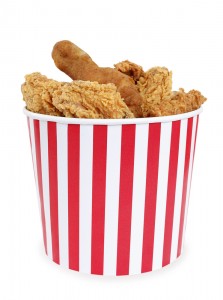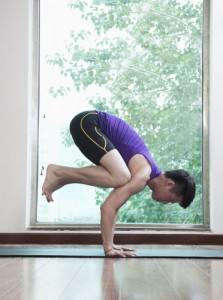Today is the conclusion of yesterday’s article, where we first discussed “How to Beat Constipation and Get Things Moving Again“.
I’m sure many would rather not be bothered reading about such a seemingly trivial inconvenience, but…
I have a feeling there’d be a change of heart after discovering constipation, when left untreated, can lead to serious health problems like…
- stomach pain
- rectal prolapse (when things meant to be tucked neatly inside your body…fall out)
- diverticulitis
- even colorectal cancer!
With that in mind, let’s look at some common reasons WHY you might be constipated…
Cause 1: Prescription Drugs
Unfortunately, many of America’s aging are loaded up on a smorgasbord of prescription pills. And it’s not just the laxatives that can cause digestive problems.
It’s probably no news to you that pharmaceuticals often carry side effects, and constipation is a common one. According to emedicinehealth (1), medicines that constipate include:
- “Antacids that contain aluminium hydroxide (Alternagel, Alu-Cap, Alu-Tab, Amphojel, Dialume) and calcium carbonate (Rolaids, Mylanta, Maalox, Tums, etc.)
- Antispasmodic drugs
- Antidepressants
- Iron tablets
- Anticonvulsant drugs
- Diuretics (because they can work like caffeine and alcohol as mentioned previously)
- Painkillers, narcotic-containing drugs, for example, may suppress bowel function.”
What to do about it? Well, a fantastic start is to seek out natural, healthier alternatives to drugs. You’ll need to speak with your doctor and do some research, but it’s amazing how many simple treatments we ignore don’t come with side effects.
Also, many conditions that plague the human body are caused by poor diet and lack of exercise (we’ll expand on these two in a bit). By fixing these variables, to start, a lot of what you think are problems turn out to be symptoms and go away.
Imagine that…
Cause 2: “Holding it In” Too Often
As a “civilized” individual, you often face moments where you have to hold your bowel movements in – perhaps  because you’re busy with work, at a meeting, embarrassed to use a toilet in someone else’s home, or grossed out by bathrooms in public places. But withholding bowel movements can cause long-term plumbing problems.
because you’re busy with work, at a meeting, embarrassed to use a toilet in someone else’s home, or grossed out by bathrooms in public places. But withholding bowel movements can cause long-term plumbing problems.
As you build up a “tolerance” to the urge, the repeated resistance can make these urges come less often and cause less of a response in the future.
Holding in your stool also becomes a problem because the longer it sits inside you the more water your body absorbs from it. Harder stool is more difficult to pass through your body.
It’s important to do what you can to heed Nature’s call when it arrives and not tell it to come back later.
Cause 3: Underlying Illnesses and Conditions
While most constipation issues are temporary or minor and not related to anything serious, there are instances in which it can be indicative of a more serious illness or condition.
Constipation has been named as a symptom of hypothyroidism, diabetes, cancer, and multiple sclerosis – to name a few. Hypothyroidism is the big one here, especially for women over 40 years old. So if you fit that demographic, it may be a good idea to get checked.
Constipation can also be caused by irritable bowel syndrome, as spasms in your colon cause food to move more slowly through your intestines and slow down your movements.
Beware the trap of overthinking constipation, though. In the information age, it’s easy to get sucked into the vortex of Googling different diseases and symptoms in an impossible attempt to self-diagnosis.
This is a dead end road and will get you worked up for nothing. If you’re not experiencing other symptoms along with constipation, there’s no reason to blame it on anything else, and as always, your doctor is the correct person to talk to about possibility of an illness.
Cause 4: Revisiting the Common Culprit – Diet
It doesn’t take a genius to see that what you put in the top end of your digestive system will affect the end of the line. Most health experts would agree that if you’re constipated the very first place to look is what you’re putting into your body.
Isn’t it funny how issues with the body so often come down to this one leverage point? As they say, “Garbage in, garbage out.” Or, in this case, not quite out as often as you’d hope.
Look, it’s okay to indulge from time to time, but an overall poor diet will always lead to complications. Get plenty of fresh vegetables, and avoid processed foods or foods high in sugar.
It’s also important to realize that a significant change in your routine, diet, or the amount of food you eat can lead to constipation. Basically, if something extreme is happening in your diet, especially something out of the norm, that very well may be the culprit.
Besides making healthier choices, keep in mind that booze and caffeine can cause constipation because they cause you to urinate more – not enough fluid in stool means difficulty going to the toilet – so you may want to avoid all dehydrating drinks. As you age, these drinks aren’t doing you any favors anyhow…
Warm liquids, prunes, and bran cereal also have helped a lot of people.
Cause 5: Bad Form
Yeah, we’re getting a bit graphic here now, but this is an important topic that most people never take the time to consider when constipated. You may not realize, but toilets as you know them actually work against the human body.
In Nature, we did not sit on something to defecate, and doing so “kinks” your colon, making it more difficult to pass your stool properly and making hemorrhoids more likely.
In many parts of the non-Western world, people still use squat toilets; while they can be a shock to people who didn’t grow up in these cultures, we may actually be the ones who are crazy. The toilets we use are unnatural and unhealthy.
Solving this problem doesn’t require retiring to Cambodia either. Simply slide a small stool up to your toilet and place your feet on it when you sit down, so as to raise your knees a little into the air.
There are also squatting toilets and toilet modifications you can purchase. Others just stand on the toilet seat and squat, which is a bit of a precarious balancing act that may not be a wise decision.
Of course, neither might be necessary to get things moving again…
What About Dietary Fiber?
Common advice for constipation has long recommended increasing your intake of high-fiber vegetables, legumes, and whole grains to clear out your intestines and help everything move through the way it’s supposed to.
However, most people seeking medical help for constipation have already increased their fiber intake substantially and are still not seeing improvement. Their problems often keep getting worse.
See, the fiber suggestion is based on the idea that getting rid of constipation requires moving more debris through the system – hence the idea that fiber is used “clean you out.” Considering that constipation is actually about a rectum full of feces that cannot be passed, though, it makes little sense to add more material.
In fact, there is strong evidence that decreasing or completely ceasing fiber intake will decrease bloatedness and abdominal discomfort, enable easy evacuation of the rectum, reduce strain, and reduce tearing and bleeding (2).
In this study, researchers found that constipation may be more about magnesium and water from foods, especially in populations with a low fiber intake (3). Would these people be better off getting more water and magnesium (see below about supplementation) instead of purging the system with fiber?
Think about it this way. Fiber is thought to clean out the system because the body can’t digest it and passes it through instead. Does it really make sense to eat foods the body cannot digest when you’re having digestive problems?
Even the idea that fiber is necessary in preventing colon cancer is now being questioned (4).
In some people, fiber can even aggravate their digestive system, causing discomfort, worsened symptoms, or even more constipation. This seems especially true with fiber supplements.
Solutions in a Bottle…
There are a few different types of supplements, aside from fiber, that may aid in digestive function and lead to more healthy bowel movements.
Some that make the list include:
- mct oil
- magnesium
- aloe vera
- probiotics
Let’s Have a Look at Probiotics

Probiotics are microorganisms, like healthy bacteria and yeast, that are consumed for health purposes.
The idea of taking bacteria purposely can be quite intimidating. Most of us are scared of bacteria – after all, isn’t it bacteria that makes you sick?
Not ALL of them…
Bacteria will always be inside your body, no matter what…and they do just as much good (maybe even more) as harm. Especially inside your digestive tract.
In fact, there are more than 500 different kinds of bacteria in your digestive system alone. And there are living cultures in many of the foods you already eat, even if you don’t realize it. Yogurt and cheese are two great examples.
These bacteria keep your intestines healthy, assist digestion, and may even boost your immune system. Sometimes the healthy, or “friendly,” bacteria in your intestines is thrown off balance, most likely after you take antibiotics or get over being sick, or when the lining of your intestines is disturbed.
Probiotics allegedly restore the balance of good and bad bacteria in your gut, and this keeps your movements healthy and regular. According to this article in Harvard Health Publications, researchers at King’s College in London identified 14 promising studies indicating the usefulness of probiotics in combatting constipation (5).
Where to get your probiotics? You can purchase supplements in tablet or capsule-form these days, but perhaps the best way is to increase your intake of dairy beverages and yogurt.
Ironically enough, probiotics also help diarrhea, which is also caused by antibiotics or infections. This is because diarrhea, much like some forms of constipation, are caused when the bacteria in your digestive system is imbalanced. The probiotics restore the balance and bring back normal functioning.
Still Not Getting the Relief You Need?
With older people, it’s likely that constipation is a result of bad diet, sedentary behavior, prescription drugs, bad bowel movement habits, bed rest, or laxative overuse.
But if none of this describes you, or if you’ve tried to correct poor health in an effort to solve constipation but aren’t having any luck, it may be time to check with the doc.
Also, if underlying conditions are suspect, it may take further testing to determine how constipated you are and why. Blood tests, barium studies that search for colon obstructions, and colonoscopies may be needed.
And of course, always get in touch with a professional if you see blood, start losing weight unexpectedly, experience a lot of pain, or have constipation for more than a two-week period.
Sources:
- http://www.emedicinehealth.com/constipation_in_adults/page2_em.htm
- http://www.ncbi.nlm.nih.gov/pmc/articles/PMC3435786/#B21
- http://www.ncbi.nlm.nih.gov/pubmed/17151587
- http://www.hsph.harvard.edu/nutritionsource/fiber-and-colon-cancer/
- http://www.health.harvard.edu/blog/probiotics-may-ease-constipation-201408217377
 Validating...
Validating... 





